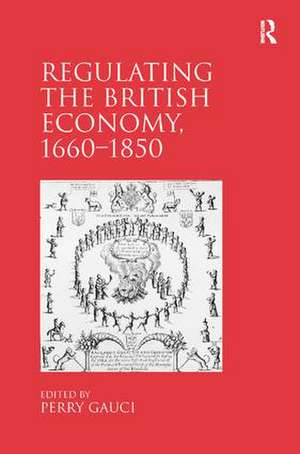Regulating the British Economy, 1660–1850
Editat de Perry Gaucien Limba Engleză Hardback – 28 iun 2011
| Toate formatele și edițiile | Preț | Express |
|---|---|---|
| Paperback (1) | 261.95 lei 43-57 zile | |
| Taylor & Francis – 14 oct 2024 | 261.95 lei 43-57 zile | |
| Hardback (1) | 1059.62 lei 43-57 zile | |
| Taylor & Francis – 28 iun 2011 | 1059.62 lei 43-57 zile |
Preț: 1059.62 lei
Preț vechi: 1292.21 lei
-18% Nou
Puncte Express: 1589
Preț estimativ în valută:
202.75€ • 212.26$ • 167.77£
202.75€ • 212.26$ • 167.77£
Carte tipărită la comandă
Livrare economică 07-21 aprilie
Preluare comenzi: 021 569.72.76
Specificații
ISBN-13: 9780754669692
ISBN-10: 0754669696
Pagini: 296
Dimensiuni: 156 x 234 x 18 mm
Greutate: 0.59 kg
Ediția:1
Editura: Taylor & Francis
Colecția Routledge
Locul publicării:Oxford, United Kingdom
ISBN-10: 0754669696
Pagini: 296
Dimensiuni: 156 x 234 x 18 mm
Greutate: 0.59 kg
Ediția:1
Editura: Taylor & Francis
Colecția Routledge
Locul publicării:Oxford, United Kingdom
Public țintă
AcademicNotă biografică
Perry Gauci, Dr, Lincoln College, University of Oxford, UK
Recenzii
'Undoubtedly, this volume is a very welcome addition to the historiography of economic and commercial regulation. It clearly identifies the complexity and variation of the regulatory process across a broad period... this is a major contribution to the historiography of regulation, political participation, parliamentary history and socio-economic tensions in employment, and will be invaluable for scholars and students alike.' English Historical Review
Cuprins
Introduction, Perry Gauci; Chapter 1 Regulatory Inertia and National Economic Growth: An African Trade Case Study, 1660–1714, William Pettigrew; Chapter 2 A Proactive State? The Land Bank, Investment and Party Politics in the 1690s, Steve Pincus, Alice Wolfram; Chapter 3 Regulation and Rival Interests in the 1690s 1 I am grateful to the workshops’ participants and to Koji Yamamoto for comments on earlier drafts., Mark Knights; Chapter 4 Towards a British Political Economy: An Eighteenth-Century Scottish Perspective, Bob Harris; Chapter 5 Learning the Ropes of Sand: The West India Lobby, 1714–60, Perry Gauci; Chapter 6 Political Convention and the Merchant in the Later Eighteenth Century, Daeryoon Kim; Chapter 7 Bounties, the Economy and the State in Britain, 1689–1800, Julian Hoppit; Chapter 8 Investigation as a Prelude to Regulation: Information, Investigation and the Abolition of the Slave Trade, Ian Barrett; Chapter 9 Facing Uncertainty: Markets, Norms and Conventions in the Eighteenth Century, Philippe Minard; Chapter 10 Regulating Wages in Eighteenth and Early Nineteenth-Century England: Arguments in Context, Joanna Innes; Chapter 11 The Transition to Factory Production in the English Wool Textile Industries: Individual and Family Desires for Labour Regulation, 1720–1850, Paul Minoletti; Chapter 12 Rent Seeking or Skill Creating? Apprenticeship in Early Industrial Britain, Jane Humphries;
Descriere
Inspired by recent research on the cultural impact of economic change, an international team of leading academics and younger scholars examine the ways in which state and society responded to fundamental economic transition. The studies embrace all aspects of the regulatory process, from developing ideas on the economy, to the passage of legislation, and to the negotiation of economic policy and change in practice. The book challenges the general characterization of the period as a shift from a regulated economy to a more laissez-faire system, highlighting the uncertain but significant relationship between the state and economic interests across the long eighteenth century.









